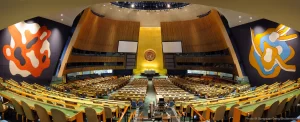 During the week of Tuesday, May 30 – Friday, June 2, the United Nations Building in New York City was the scene of the Second Session of the Permanent Forum of People of African Descent (PFPAD). The Permanent Forum was created after several international activists, including civil society advocates, had called for a standing committee to take actions in support of Afrikan People and People of Afrikan Descent that had heretofore not been within the authority of other United Nations bodies such as the Working Group of Experts on People of African Descent (WGEPAD).
During the week of Tuesday, May 30 – Friday, June 2, the United Nations Building in New York City was the scene of the Second Session of the Permanent Forum of People of African Descent (PFPAD). The Permanent Forum was created after several international activists, including civil society advocates, had called for a standing committee to take actions in support of Afrikan People and People of Afrikan Descent that had heretofore not been within the authority of other United Nations bodies such as the Working Group of Experts on People of African Descent (WGEPAD).
PFPAD Chair Epsy Campbell Barr (Costa Rica) presided over the week’s Second Session.

Epsy Campbell Barr, Chair of the Permanent Forum.
The First Session of PFPAD had been held in December 2022 in Geneva, Switzerland. Several Pan-Afrikan activists had traveled to Geneva or participated in that First Session online. A larger number descended upon New York City for this Second Session, and apparently the UN Headquarters in New York was not prepared for it. The result was long lines just to enter the building and pass all the security checks, which became a serious hindrance for those who were Elders or people with disabilities.
During the four days of the Second Session, statements were made by members of the Permanent Forum, by UN member states and, finally, by civil society activists. The Conclusions and Recommendations below reflect the discussions that were held during the week, and the tentative decisions made by the Permanent Forum as a result.
Below are the transcribed remarks from PFPAD members Ms. Gaynell Curry (Bahamas) and Mr. Michael McEachrane (Sweden) on the Friday, June 2 Closing of the Second Session of the Permanent Forum of People of African Descent (PFPAD), in which they read the Conclusions and the Recommendations from the weeklong Session.
After their remarks, I’ve added a few notes to explain a bit about how I’ve transcribed these comments, but also to point out some comments I have regarding statements made in the Conclusions and Recommendations.
I have made every effort to transcribe these statements as best I can. Some of the comments the speakers made as part of their readings came across as a bit disjointed and difficult to follow, and thus a few of the typed comments may not flow well grammatically.
There will certainly be more comments and statements from members of civil society who participated in person and online, some of them complimentary and others critical of the Session. Continued discussion among Pan-Afrikan civil society needs to be robust, sincere and conscientious if we are to make certain that bodies like this are more responsive to the people, and failing that, investigating the possibility of creating our own independent mechanism to represent the voice of the people.
*******************************************************
Second Session, Permanent Forum of People of African Descent (PFPAD)
Final Day of Discussion
Friday, June 2, 2023
Statements of Conclusions and Recommendations
Gaynell Curry
Member of the Permanent Forum
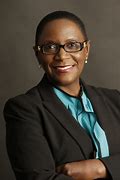
Member of the Permanent Forum Gaynell Curry.
Thank you very much Madam Chair. I am pleased to present the preliminary conclusions and recommendations of the UN Permanent Forum on People of African Descent Second Session from 30th of May to the 2nd June 2023 in New York City, USA.
Introduction.
The United Nations Permanent Forum on People of African Descent held its Second Annual Session from the 30th of May to the 2nd of June 2023 at the United Nations Headquarters in New York City. In addition to opening of the Second Session and the general debate, five thematic discussions were held, including global reparatory justice, Pan Africanism for dignity, justice and peace, transnational migration, recognizing and addressing systemic and structural racism, a data driven and evidence based approach, and health, well-being and intergenerational trauma. The event was attended by member states, United Nations entities, and approximately 900 civil society representatives and other stakeholders from across the world, participating in person@ and online#. In addition, more than 60 side events were also held. The Permanent Forum expresses its appreciation to all participants.
The following conclusions and recommendations are preliminary in nature. Together with the proceedings of the first session, they will form the basis of the first report of the Permanent Forum to the Human Rights Council and the General Assembly in Fall 2023.
Conclusions.
1. Bearing in mind the approaching closure of the International Decade of People of African Descent in 2024, the Second Session of the Permanent Forum of People of African Descent has asserted the expectation that there will be a UN Declaration on the promotion, protection and full respect of the human rights of People of African Descent. In accordance with the mandate of the Resolution A/75/226, the Permanent Forum values the clear commitment from various delegations and other stakeholders as well as the interest on the part of civil society regarding an International Declaration on the Rights of People of African Descent. The Permanent Forum urges the General Assembly to proclaim a Second International Decade of People of African Descent, intending to take further the actions to bring about the full recognition, justice and development pf People of African Descent.
2*. The Permanent Forum of People of African Descent recognizes that the inclusion of those who have been excluded and marginalized in decision making forums and institutions in the United Nations and by states is at the core of its mandate. It is therefore a matter of priority that the Sessions of the Permanent Forum reflects in active measures to remove all structural barriers and obstacles faced by participants and in particular representatives of civil society.
In the considered view of the Permanent Forum, reflecting feedback of experiences by members of civil society, there needs to be a concerted effort to ensure Portuguese translation, (applause) affirmative measures to ensure availability of grounds passes for participants prior to the session, (applause) adequate accommodations for people who are elderly, disabled (applause), or otherwise unable to queue for hours, ensuring rooms with adequate accessibility to sessions and side events. In the UN compound and more, an event of the scale of this Second Session is historic and momentous, and requires the same special measures and accommodations made for delegations of other high capacity events.
The Permanent Forum stresses that while many mandates in the UN are amply funded, civil society organizations supporting People of African Descent lack adequate support, even struggling to send representatives to important events, including the Permanent Forum. the UN Organization should recall that law, policy and procedures have often served to silence calls for justice and fairness against systemic and structural racism. The Permanent Forum represents the most representative global, multi sector representation of People of African Descent, seeking to promote and protect human rights, in UN history. The status quo, or business as usual, should not be interposed as an excuse of the UN Organization to displace cost, time or discomfort to access for the use of, or access to the UN facilities to individual participants of the annual Sessions of the Permanent Forum, when the UN system itself has the capacity to accommodate high volume special events, or to troubleshoot or course correct procedures to add efficiency to the process. At the highest level, the UN Organization committed to be a partner in racial equality after the murder of George Floyd. This must include creating an enabling environment for the People of African Descent to be heard, and acknowledging the deterrent effect of spending hours queuing for access, tactics People of African Descent experience in voter suppression efforts and elsewhere. (applause)
3*. The Permanent Forum affirms that reparations is what justice looks like in the 21st century, and that there can be no sustainable development agenda without reparations. As recognized by the Durban Declaration and Programme of Action, the critical importance of many parts of the world for the full and equal realization of human dignity and rights of People of African Descent depends on reparatory justice for the histories and legacies of colonialism, enslavement, apartheid at the domestic and international levels. Furthermore, the Permanent Forum affirms that these are crimes against humanity, and constitute genocide. (applause) The trauma occasioned by these acts have endured for centuries, and manifest in numerous ways, including intergenerational health impact, ongoing societal stigma, and a lack of self esteem, a sense of self and cultural cohesion of People of African Descent worldwide. In the swift provision of reparatory justice, the survivors of these crimes demand that no remedy be imposed on them without their consultation and deep involvement. We say, nothing about us without us. (applause)
The Permanent Forum encourages member states to take concrete actions toward reparatory justice at both the domestic and international levels, to treat this as a matter of justice and not as a matter of charity or aid and, in the process, center the will, participation and needs of People of African Descent. The Permanent Forum acknowledges the apology offered by the Dutch government in December 2022 for its historic enslavement of Africans and People of African Descent while stressing that an apology for crimes against humanity by a state cannot be followed by the refusal to provide repair without condemnation by the United Nations. (applause)
The Permanent Forum recognizes that there is at present no specialized international court that has been designed or equipped to deal with reparations claims of the magnitude and complexity of the claim of reparations for the slave trade, hundreds of years of African enslavement, and the multiplicity of related injustices, injuries and damages to People of African Descent in the various countries of the world. While the International Court of Justice , the ICJ, exists, it is inadequate in terms of its design, and it also suffers from the defect occasioned by several of the former colonial and enslaver nations having made reservations to the ICJ Treaty prohibiting the ICJ from adjudicating claims of wrongdoing prior to these nations’ accession to the ICJ Treaty.
4*. The Permanent Forum of People of African Descent reiterates that Pan Africanism was and still is a global movement for the liberation of Africans and People of African Descent from colonialism, enslavement, subjugation and systemic and structural racism. The Permanent Forum welcomes a Pan Africanism for dignity, justice and peace as a much needed vehicle for People of African Descent to effectively address lasting vestiges of colonialism, systemic and structural racial discrimination as it affects both Africans and People of African Descent globally, especially ay the international level. Moreover, to affirm that many social, cultural and political ties that bind the African Diaspora to Africa, including the Pan Africanism of the African Union, the AU, and its Agenda 2063, and inclusion of the African Diaspora as its Sixth Region.
The Permanent Forum suggests that a resolute Pan Africanism for dignity, justice and peace in the 21st Century needs to be firmy grounded in human equality and non-discrimination and the rule of law. It must address impunity and be mindful and fully inclusive of differences among Africans and People of African Descent, including women, elders, persons with disabilities, youth, migrants and LGBTQI people. (applause) Moreover, it needs to be a Pan Africanism for environmental justice and increasing social, economic and environmental sustainability in the world. The Permanent Forum welcomes initiatives taken by the Caribbean Community, CARICOM, the AU and others towards putting Pan Africanism into concrete action, the spirit of Pan Africanism and such initiatives. The Permanent Forum extends an invitation to the AU and CARICOM to initiate dialogs on how the Permanent Forum can collaborate with the AU and CARICOM in this regard.
The Permanent Forum celebrates the pioneering Pan Africanism of the sovereign nation of Haiti, and recognizes that much of its prolonged crisis is caused by the longstanding neocolonialist campaign against the world’s first free Black republic. The Permanent Forum also acknowledges the Pan Africanism of the 1920 Declaration of the Rights of the Negro Peoples of the World by the Universal Negro Improvement Association as a forerunner of the forthcoming UN Declaration of the human rights of People of African Descent.
5*. The Second Session of the Permanent Forum highlighted that there are many structural inequalities in transnational migration across the world, and that Africans and People of African Descent are particularly exposed to these structural inequalities. Among them are inequalities in the freedom of movement of people in so-called developed and developing countries, access to visas, global share of the amount of refugees hosted by countries in the Global South and the Global North, enjoyment of refugee rights, vulnerability of cruel, inhumane and degrading treatment, exploitation and violence, and the deaths of migrants. Two groups were pointed out as especially vulnerable to global inequalities in transnational migration. These were Haitian migrants and Black African migrants crossing North Africa and the Mediterranean, trying to reach Europe. It was further pointed out that the root causes of Haitian migration were grounded in crimes of colonialism and enslavement. It was also emphasized that racism is key to the plight of many African and African Descendant migrants, and that the international community has a responsibility to ensure safe, orderly , regular, and not least equitable forms of migration for Africans and African Descendant migrants.
6*. The Permanent Forum reiterates that the human rights of People of African Descent , the comprehensive recognition, monitoring and effective access to systemic and structural racism should become a cornerstone of the forthcoming UN declaration on the human rights of People of African Descent. At the Second Session, it was added that the human rights should include recognition and address of systemic and structural racism at both the domestic and international levels. It was mentioned that People of African Descent are a group that require statistical diagnostic and monitor their human rights situations to inform targeted, measurable and accountable policy making. Such diagnosis should include how the human rights situation of People of African Descent — race — intersect with other grounds such as ethnicity, gender, sexuality, education, socioeconomic class, and geographic location.
Moreover, it was pointed out that to use disaggregated data collection to hold states accountable for the nature and extent of systemic and structural racial stratification and discrimination. Measuring and monitoring systemic and structural racism needs to be the context, purpose and interpretative framework of the data collection and evidence gathering. This point was further illustrated by that, despite the disaggregated data surveys, coming out of European Union agencies of fundamental rights, such as the European societies, suffer from systemic and structural racial stratification, and that People of African Descent on average are at a disadvantage across areas of society. There is little to no recognition in Europe and in the European states and societies People of African Descent suffer from systemic and structural racism, and privileged people racialized as white Europeans and dis-privileged people racialized as non-European descendants, People of African Descent in particular. Furthermore, it was pointed out that a right to comprehensive recognition of systematic and structural racism , stratification and discrimination as it affects People of African Descent needs to be a right to recognition of the broader social, international and historical context of systemic and structural racism, including the lasting impacts of systemic and structural racism at the domestic and international levels of colonialism, enslavement and other forms of racialized dehumanization, institutional forms of racial apartheid and racial segregation, embedded notions of practices of racial superiority, white superiority and other forms of racial domination, as well as racial and ethnic nationalism.
7*. Furthermore, the Permanent Forum notes that although digital technologies and artificial intelligence holds great promise in the collection and analysis of data to monitor racism and inform policy making, the work of inequalities and atrocities is being reproduced in the digital transformation and the world of artificial intelligence. First, because Black populations are misrepresented or non-represented in the data that is used to develop artificial intelligence tools; second, because there is no check-ups … given that 85% of artificial intelligence developments are done by white male only teams, there is no surprise that the outcomes are being discriminatory and racist. This is dangerous, because of the many decisions that are being taken with the support of artificial intelligence and without ethical guardrails that risk many massively ineffective Black populations.
8*. The Permanent Forum expresses deep concern about the often profound negative impact of racism and racial discrimination on the health and well-being of People of African Descent, which have created barriers to enjoying thr human right to health, resulting in chronic diseases including hypertension, heart disease and diabetes. From birth to death, People of African Descent fare worse in measures of health compared to their white counterparts, such as higher rates of infant and maternal mortality, higher incidence of asthma during childhood, greater rates of high blood pressure and intergenerational trauma, due to the weathering of racism, intergenerational trauma, legacies of colonialism, enslavement on the Trans Atlantic trade in enslaved Africans on physical and mental health. The Permanent Forum recognizes the intersectionality of health disparities faced by People of African Descent on multi-faceted factors involving racism, racial discrimination as well as social, economic and environmental factors. To improve health outcomes for People of African Descent, it is critical to address racism and racial discrimination in all aspects of society. This includes addressing systemic and structural inequalities and discrimination in health care, education, employment, housing and public policy. Promoting cultural competency and diversity in health care is also essential. A multi-faceted approach is required to address underlying social determinants of health disparities faced by People of African Descent, through combatting systemic racism and discrimination, empowering communities of People of African Descent, utilizing traditional knowledge capacity building and health care systems, and partnership among member states, the WHO, and regional bodies in the prevention and control of diseases.
Thank you, I will stop here to hand over to my colleague Michael who will give you the Recommendations.
Michael McEachrane
First Rapporteur, Member of the Permanent Forum
Thank you Gaynell. Good afternoon everyone. So I am now going to read our Preliminary Recommendations.
Recommendations.
A Second Decade.
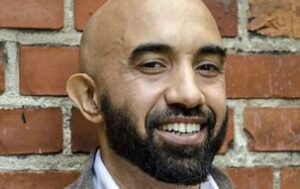
First Rapporteur and Member of the Permanent Forum Michael McEachrane.
9. The Permanent Forum reiterates its call for a Second International Decade of People of African Descent, 2025-2034, and recommends that it is focused on reparatory justice, recognition and address of systemic and structural racism at both the domestic and international levels and the realization of the forthcoming UN Declaration on the Human Rights of People of African Descent.
The Declaration.
10. The Permanent Forum is currently embarking on a series of comprehensive regional consultations across the world on the drafting of the forthcoming UN Declaration on the Human Rights of People of African Descent, is looking forward to sharing with the InterGovernmental Working Group on the effective implementation of the Durban Declaration and Programme of Action during Spring 2023 as substantial contribution to the drafting of the Declaration, including comments on the latest Draft Declaration and a full draft of the Declaration with explanatory comments, and is calling on the IGWG, that is the InterGovernmental Working Group, to carefully consider and make ample room in its deliberations on the Declaration for this submission by the Permanent Forum.
Accessibility and resources.
11. The UN should remove all structural barriers as outlined above in the conclusions, and also work to generate robust member state financial support for the Permanent Forum and to expedite the effective removal of structural barriers for those who wish to attend the annual sessions of the Permanent Forum. the UN Organization should issue a communication publicly, available to the Permanent Forum and civil society, addressing the structural barriers and share its plans to facilitate access for future sessions of the Permanent Forum well in advance of its next session in April 2024.
12. The Permanent Forum will take upon itself to facilitate annual donor roundtables with members of the Permanent Forum, member states, grant makers, civil society and the private sector.
13. A task force on People of African Descent should be formally established including all United Nations actors working on the issues of the agenda of People of African Descent and against racism. It should have a program of action with goals, follow-up indicators and resources in an internal agenda within the United Nations system.
14. Appoint a Special Envoy on People of African Descent of the Secretary General, with the objective of following up on the work of the agencies and accompanying the states in the follow-up of the actions that are generated in favor of Afro Descendants.
15. The UN should create an affirmative action program for the hiring of People of African Descent, including the appointment to global, regional and national leadership positions (applause), taking into consideration that this affirmative action should involve women, who are triply discriminated against. (applause)
Global reparatory justice.
16. Besides the recommendations put forth by the Permanent Forum, in its preliminary conclusions and recommendations from the First Session, including the establishment of a global reparatory justice commission, the Permanent Forum recommends that the following measures be taken:
(a) elaborate a future treaty on crimes against humanity that is universal, complementary and implementable, and the important point of the necessity to expand the definition of crimes against humanity to address matters that could be progressively developed, in particular, to extend the list of prohibited acts to include, for instance, economic land and mineral exploitation and environmental degradation. In this regard, the Permanent Forum is also recommending an amendment to the Rome Statute to enumerate, inter alia, “the slave trade under crimes against humanity” in article 7 of the Rome Statute.
(b) urgent establishment by the United Nations for a new specialized international tribunal that will be specifically designed and equipped with the necessary skills and expertise to handle the large variety of reparations claims for African enslavement that exist. Such a tribunal should be equipped both to adjudicate the legality of a reparations claim and to assess the various categories of damages as well as to quantify or delineate appropriate damages or packages of reparatory measures. The tribunal will be expected to assess the quantum of compensation of package of reparatory measures. The initial work of conceptualizing the establishment of such a tribunal should be undertaken by the UN Permanent Forum of People of African Descent.
(c) the establishment of an international UN task force on reparatory justice, consisting of prominent civil society advocates, legal experts and researchers on reparatory justice to, in collaboration with and support of a global reparatory justice commission of member states, facilitate the formulation of a comprehensive global reparatory justice program and action plan.
Pan Africanism for dignity, justice and peace.
17. The Permanent Forum recommends the establishment of a UN Pan African group of friends of the Permanent Forum, led by African and Caribbean member states, to be in dialog with members of the Permanent Forum about building synergies around such joint courses as reparatory justice, and address systemic and structural racial stratification and discrimination in the international order. In addition, the Permanent Forum recommends that it be given space at the Annual Summits of the African Union and CARICOM’s annual heads of government meetings to present its work and be in conversation with African and Caribbean heads of states about Pan African affairs.
Trans national migration.
18. The Permanent Forum recommends that the International Organization for Migration include data collection and reporting on racial stratification and disparities in national and international regimes of migration, especially as these affect Africans and People of African Descent, including, among other things, inequities in the freedom of movement of people in so-called developed and developing countries, access to visas, global share of the amount of refugees hosted by countries in the Global South and the Global North, enjoyment of refugee rights, vulnerability to cruel, inhuman and degrading treatment, exploitation and violence, and the deaths of migrants. This reporting should also include recommendations to the UN and its member states on how racial disparities in transnational migration can be effectively addressed.
An evidence-based approach to systemic racism.
19. A pilot project could be developed by the Permanent Forum in collaboration with the UN Population Fund and the government of Brazil to test UN guidelines as has already been recommended by the Permanent Forum in its First Session for a comprehensive human rights-based and data-driven approach to monitoring, recognizing and effectively addressing systemic and structural racism against People of African Descent at the domestic levels. For the international level, the General Assembly and Human Rights Council could take several short and long term initiatives towards monitoring, recognizing and effectively addressing systemic and structural racism among countries and peoples, especially as it affects Africans and People of African Descent. these initiatives should take into consideration how histories and legacies of colonialism and enslavement have shaped the international order, including the global economy and relationships of power at the UN and other institutions of global governance. such initiatives could be:
(a) that the UN Permanent Forum, in collaboration with the United Nations Conference on Trade and Development and the Working Group of Experts on People of African Descent, and in close consultation with other anti-racism mechanisms, the Special Rapporteur on the Rights to Development, the Working Group on Business and Human Rights, and the Statistical Commission pertaining to the 2030 Agenda for Sustainable Development, draft guidelines and a pilot report for data collection on racial inequities in the global economy, including structural legacies of colonialism, enslavement and racial discrimination, especially as they pertain to Africans and People of African Descent.
(b) a General Assembly commemoration of the 50th Anniversary of the 1974 Declaration of a New International Economic Order and the Charter of Economic Rights and Duties of states. For this, the United Nations Conference on Trade and Development could draft a report on the understanding of structural inequities in the global economy of the New International Economic Order and its continuing relevance to addressing them. It could include an updated analysis of the global distribution of trade rules, regulations, foreign debt, prices of raw materials and other export goods, domestic and foreign control over natural resources, labor rights and conditions in transnational value chains, business profits, patterns of production and consumption, ecological footprint, loss and damage. The report and commemoration could pay particular attention to the positions and roles of Africans and People of African Descent in the global economy and form the basis for solution-oriented conversations and actions.
21 ^. The Permanent Forum strongly encourages the inclusion of data on racial disparities, especially as they affect Africans and People of African Descent, and the often multiple and intersecting forms of discrimination, in the monitoring and implementation of the sustainable development goals, and that this be included in the programs of the upcoming 2023 SDG Summit and the Summit of the Future.
Health.
22. The Permanent Forum could consult the World Health Organization on the production of a report on the health of People of African Descent and the impact of racism and racial discrimination.
Thank you all. That’s it.
EDITOR’S NOTES:
While the participation of civil society is noted, several issues with this participation should also be noted:
(1) The process for admission to the UN grounds and to the assembly hall were clearly excessively cumbersome and had a chilling effect on civil society’s capacity to participate. Hours-long delays, creating special hardships for Elders and people with disabilities, not only cut against the credibility of assurances of access but also may have been in blatant violation of the Americans with Disabilities Act, among other statutes.
(2) Permanent Forum members and United Nations member states were still given priority over civil society activists in terms of availability and time to make statements. Member states, in particular, were afforded at least five minutes to make statements while African and African Descendant civil society representatives saw their microphones unceremoniously cut off after no more than two minutes. Furthermore, member states and officials of the Permanent Forum availed themselves of opportunities to “take the mic” several times over, allowing them to re-state information already known to those in attendance, engage in arguments with civil society activists under the “right to respond” and essentially “run out the clock” on available time to make comments, thus further constraining civil society access to these proceedings.
(3) As a result, several important points of discussion were never actually broached. I will mention three here, though there are certainly many others that can be referenced. As much as the murder of George Floys is mentioned in UN circles, there was no comprehensive discussion of police brutality and abuse except for one Brazilian civil society activist who thankfully was able to invoke the name of Brazilian activist Marielle Franco, who had been terrorized and killed by Brazilian police on March 14, 2018. The plight of the United States’ political prisoners was not even mentioned. The deficit in connection between international activists, including many civil society activists, and the People of African Descent living in the ghettos, favelas and urban centers of the United States, the Caribbean, Central America, South America and Europe, where their cries have almost never been heard in UN and AU circles because they have not effectively “drilled down” to those communities even as they claim to represent grassroots civil society, was never discussed.
(4) A request has been made to the Permanent Forum to seek an advisory legal opinion from the International Court of Justice (ICJ) pertaining to a reparations claim based on our status as prisoners of war under the Geneva Conventions stemming from the 1452 Dum Diversas papal bull which proclaimed total war on Africa and the subjugation of Africans to “perpetual servitude” as the Trans-Atlantic Slave Trade was commencing. Several presenters at the Permanent Forum’s Second Session who had expressed their support of the request nonetheless failed in their statements to mention this strategy. Finally, a civil society representative managed to be recognized at which point he made mention of this strategy. Still, the request for an advisory legal opinion from the ICJ was later discounted at the end of Point 3 in the Conclusions statement above (despite the fact of the difference between making a claim and requesting a legal advisory opinion), and so far the request for that advisory opinion, which would supposedly require nothing more than the signature of the Permanent Forum Chair, remains unsigned.
# It should be noted that, while online civil society members were indeed present in the Zoom Room (as was I), and were able to monitor the proceedings through Zoom (except for Friday’s session which was strangely only broadcast in Spanish with no availability for interpretation), several factors actually prevented us from fully participating in the discussion, to wit:
(1) There was never any opportunity afforded to online participants to make statements, despite the fact that at least five of those online participants (including myself, Bro. Siphiwe Baleka, grassroots activists from Jamaica and Panama as well as others) were present and had raised our hands continuously from the beginning.
(2) After several hours on Wednesday in which civil society participants were able to at least communicate with each other in the Zoom Chat and exchange contact information, the Chat itself was cut off, perhaps to prevent further collaboration between online civil society participants.
(3) While previous Zoom meetings have afforded online participants the option of copying the Chat Notes to their home computers, this option was denied to online civil society participants.
(4) The final day of the session was strangely broadcast only in Spanish, with no opportunity for interpretation into English or any other language, unlike previous days. To hear the Conclusions and Recommendations in English, one had to watch on UN Web TV, which not only offered no opportunity for online participants to make statements but also broadcast at least one minute behind the Zoom feed, so even if online participants were ever to be called upon to make statements, the delay made a timely response practically impossible.
* While Ms. Curry announced Point 1, she actually did not announce the following points by number. We have reviewed the text to extrapolate Points 2 through 8. We understand that there were eight points because Michael McEachrane began his reading of the Recommendations with Point 9.
^ It appears that Mr. McEachrane skipped from Point 19 to Point 21, in which case either he lost count in his reading or Point 20 was completely omitted in his remarks. Perhaps we will find out which of the above happened when the written Recommendations are published, whenever that is.
Like this:
Like Loading...
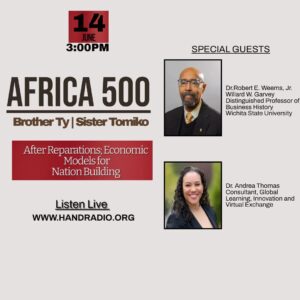 The Wednesday, June 14, 2023 edition of Africa 500 welcomes two special guests who join hosts Sis. Tomiko and Bro. Ty to discuss the topic After Reparations, Economic Models for Nation Building: Dr. Andrea Thomas and Dr. Robert E. Weems Jr.
The Wednesday, June 14, 2023 edition of Africa 500 welcomes two special guests who join hosts Sis. Tomiko and Bro. Ty to discuss the topic After Reparations, Economic Models for Nation Building: Dr. Andrea Thomas and Dr. Robert E. Weems Jr.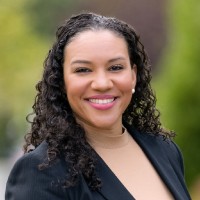 Dr. Andrea Thomas
Dr. Andrea Thomas 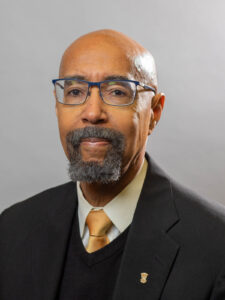 Dr. Robert E. Weems, Jr.
Dr. Robert E. Weems, Jr.
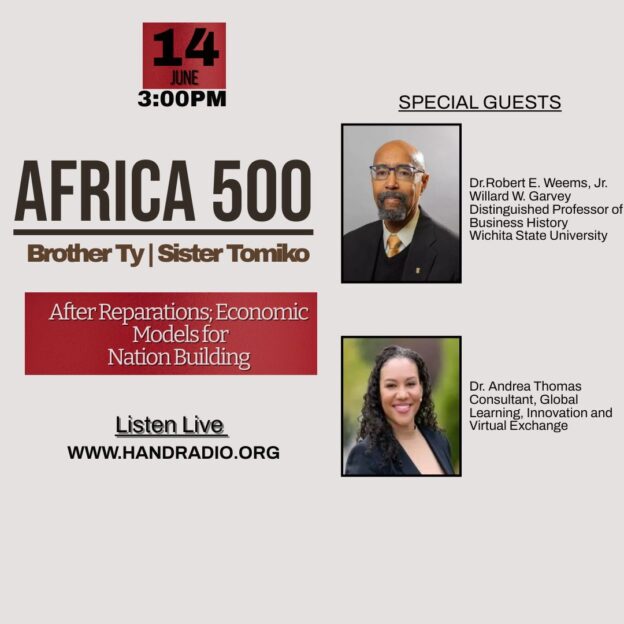
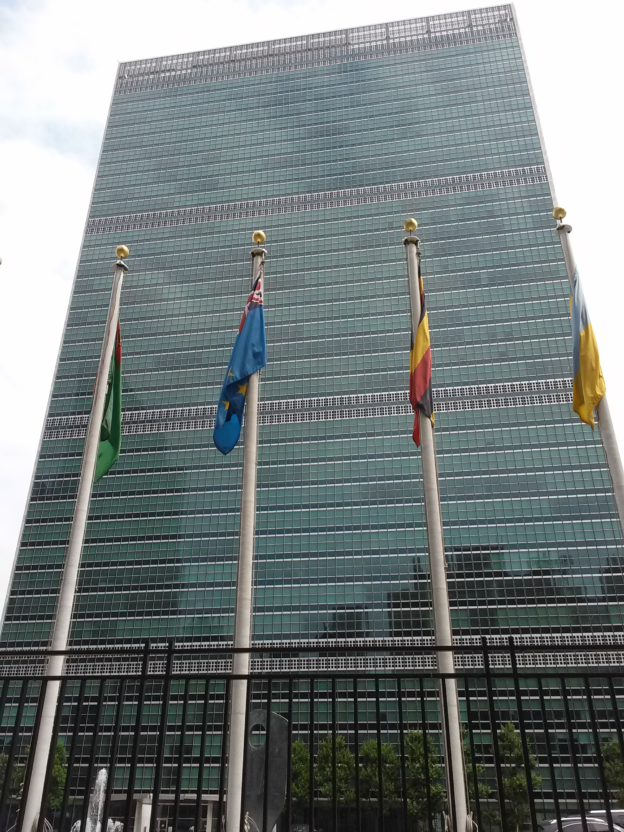
 During the week of Tuesday, May 30 – Friday, June 2, the United Nations Building in New York City was the scene of the Second Session of the Permanent Forum of People of African Descent (PFPAD). The Permanent Forum was created after several international activists, including civil society advocates, had called for a standing committee to take actions in support of Afrikan People and People of Afrikan Descent that had heretofore not been within the authority of other United Nations bodies such as the Working Group of Experts on People of African Descent (WGEPAD).
During the week of Tuesday, May 30 – Friday, June 2, the United Nations Building in New York City was the scene of the Second Session of the Permanent Forum of People of African Descent (PFPAD). The Permanent Forum was created after several international activists, including civil society advocates, had called for a standing committee to take actions in support of Afrikan People and People of Afrikan Descent that had heretofore not been within the authority of other United Nations bodies such as the Working Group of Experts on People of African Descent (WGEPAD).


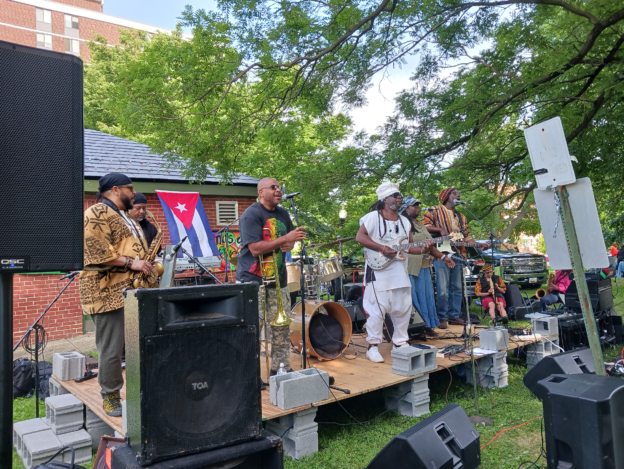
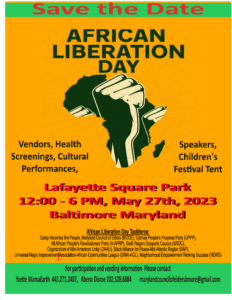
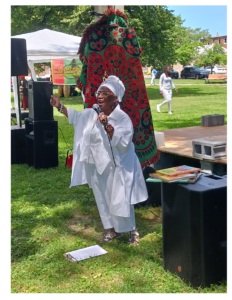
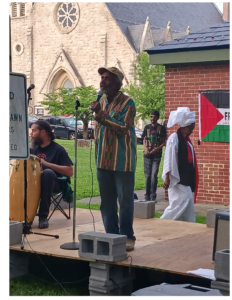
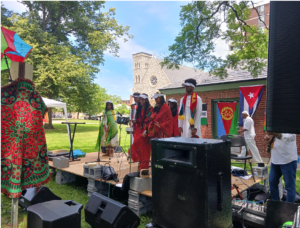
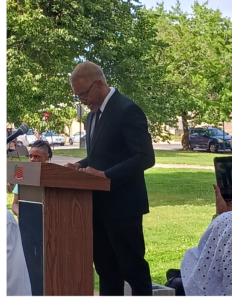
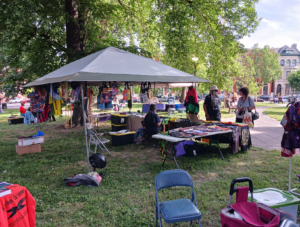
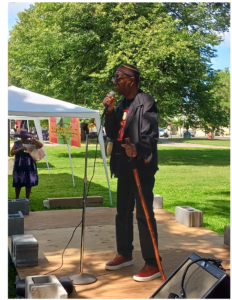
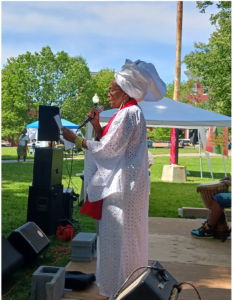
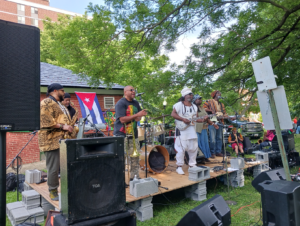
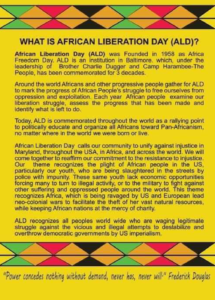
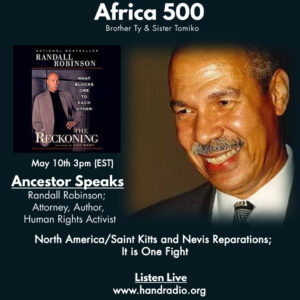 The Wednesday, May 10, 2023 edition of Africa 500 once again features a speech by recent Ancestor Randall Robinson. The April 26 edition featured a tribute to this Pan-Afrikan giant as show hosts Sis. Tomiko and Bro. Ty welcomed Special Guests Mama Efia Nwangaza, Baba Francois N’Dengwe and Honorable Prime Minister of St. Kitts and Nevis Dr. Terrance M. Drew. For that show, click
The Wednesday, May 10, 2023 edition of Africa 500 once again features a speech by recent Ancestor Randall Robinson. The April 26 edition featured a tribute to this Pan-Afrikan giant as show hosts Sis. Tomiko and Bro. Ty welcomed Special Guests Mama Efia Nwangaza, Baba Francois N’Dengwe and Honorable Prime Minister of St. Kitts and Nevis Dr. Terrance M. Drew. For that show, click 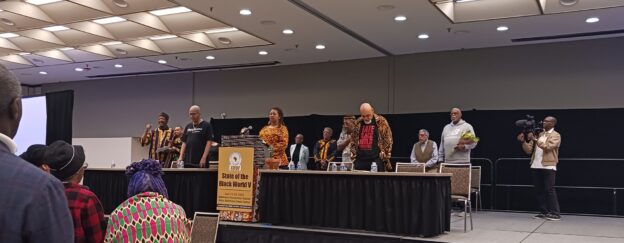
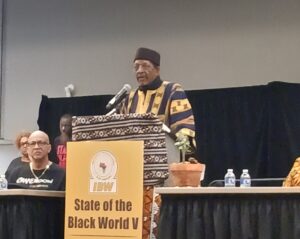
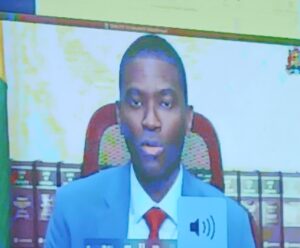
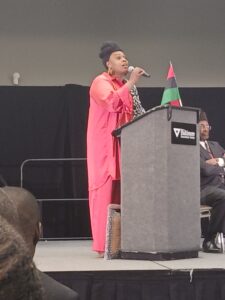
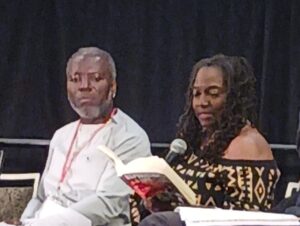
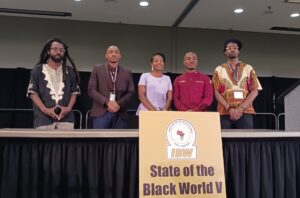
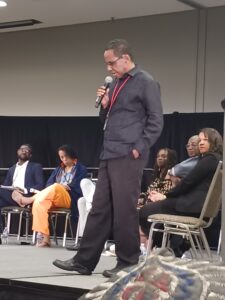
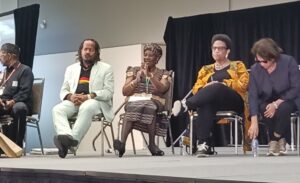
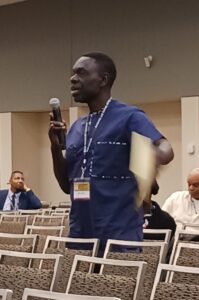
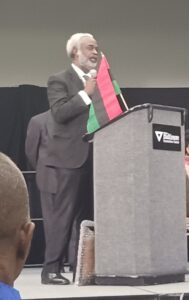
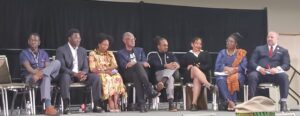
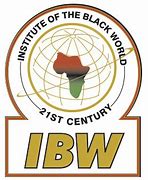
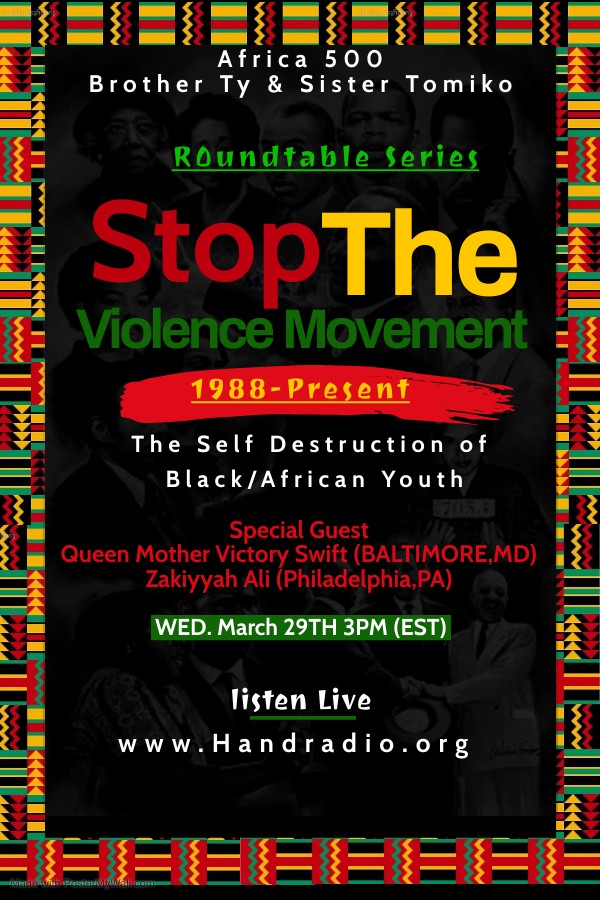
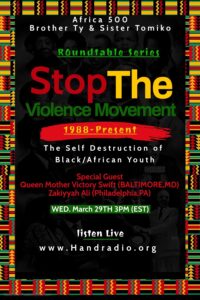 The Wednesday, March 29 edition of Africa 500 continues the conversation that was started the previous week as Sis. Tomiko and Bro. Ty once again welcome Queen Mother Victory Swift (Our Victorious City-Baltimore, MD) and Mama Zakiyyah Ali (Philadelphia, PA). The topic is part of Africa 500’S Roundtable Series, The Stop the Violence Movement, 1988-Present, The Self-Destruction of Black/African Youth.
The Wednesday, March 29 edition of Africa 500 continues the conversation that was started the previous week as Sis. Tomiko and Bro. Ty once again welcome Queen Mother Victory Swift (Our Victorious City-Baltimore, MD) and Mama Zakiyyah Ali (Philadelphia, PA). The topic is part of Africa 500’S Roundtable Series, The Stop the Violence Movement, 1988-Present, The Self-Destruction of Black/African Youth.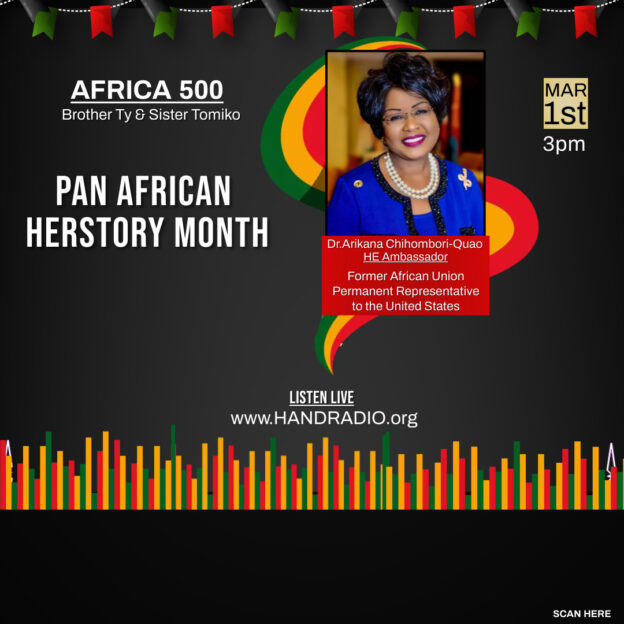
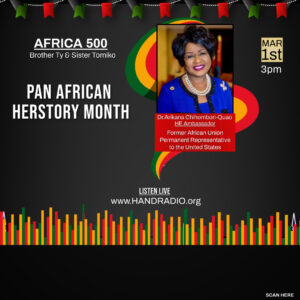
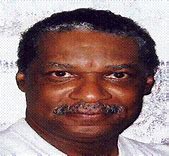
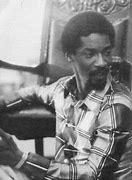 murdering a Baltimore City police officer and seriously injuring another. Despite Baba Eddie’s protestation of innocence and a lack of any physical evidence linking him to the case, he was convicted and sentenced to life in prison. It was in prison, at the Maryland House of Correction in Jessup, Maryland, not-so-affectionately known as “The Cut”, that I met Baba Eddie. I had talked with him over the phone a couple of times, and I was at “The Cut” specifically to meet him and be introduced to the Writers’ Club, a group of inmates who used prose, poetry and other literary pursuits to help them heal their psyches and, for those who could look forward to release one day, prepare them to better cope with the world outside. I was impressed with the calm that Baba Eddie exuded, and I wrote about my encounter with him in the newsletter I was writing at the time (
murdering a Baltimore City police officer and seriously injuring another. Despite Baba Eddie’s protestation of innocence and a lack of any physical evidence linking him to the case, he was convicted and sentenced to life in prison. It was in prison, at the Maryland House of Correction in Jessup, Maryland, not-so-affectionately known as “The Cut”, that I met Baba Eddie. I had talked with him over the phone a couple of times, and I was at “The Cut” specifically to meet him and be introduced to the Writers’ Club, a group of inmates who used prose, poetry and other literary pursuits to help them heal their psyches and, for those who could look forward to release one day, prepare them to better cope with the world outside. I was impressed with the calm that Baba Eddie exuded, and I wrote about my encounter with him in the newsletter I was writing at the time (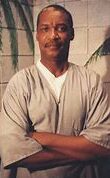 known as Jericho, which advocated for the hundreds of Political Prisoners being held in penitentiaries, prisons and jails in the US, from Mumia Abu-Jamal and MOVE in Philadelphia, to Indigenous First Nations Political Prisoner Leonard Peltier and the American Indian Movement (AIM), to White Political Prisoners such as Thomas Manning and Marilyn Buck, to Panthers imprisoned across the country that included Dr. Mutulu Shakur, Sundiata Acoli, Romaine “Chip” Fitzgerald, Veronza Bowers, Hugo “Yogi” Pinnell, Wopashitwe Mondo Eyen we Langa and Ed Poindexter, to exiles such as Assata Shakur, and of course to Baba Eddie.
known as Jericho, which advocated for the hundreds of Political Prisoners being held in penitentiaries, prisons and jails in the US, from Mumia Abu-Jamal and MOVE in Philadelphia, to Indigenous First Nations Political Prisoner Leonard Peltier and the American Indian Movement (AIM), to White Political Prisoners such as Thomas Manning and Marilyn Buck, to Panthers imprisoned across the country that included Dr. Mutulu Shakur, Sundiata Acoli, Romaine “Chip” Fitzgerald, Veronza Bowers, Hugo “Yogi” Pinnell, Wopashitwe Mondo Eyen we Langa and Ed Poindexter, to exiles such as Assata Shakur, and of course to Baba Eddie.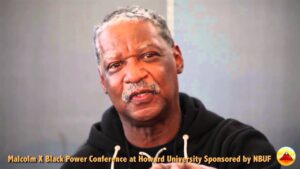 revolutionary activism of his youth, but he continued to work on behalf of the rights of the people and the truth. He began working at The Real News in Baltimore (
revolutionary activism of his youth, but he continued to work on behalf of the rights of the people and the truth. He began working at The Real News in Baltimore (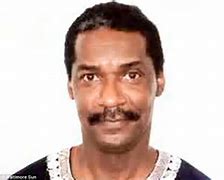 Below are several links to just a few of the articles, videos and podcasts that have been produced to pay tribute to Baba Eddie:
Below are several links to just a few of the articles, videos and podcasts that have been produced to pay tribute to Baba Eddie: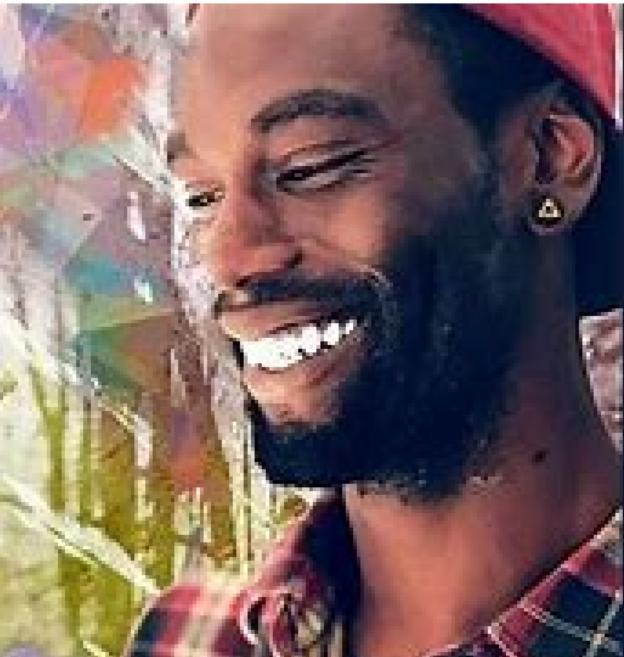
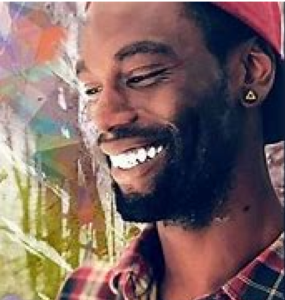 The police apologists will once again insist that “these are just a few bad apples” and that “99.9 percent of police do their jobs honorably and with respect for citizens.” How is it, then, that people of Afrikan descent seem to so often encounter that 0.1 percent of police who are violent, corrupt and racist? How was Oscar Grant killed while he was handcuffed, face down, on a Bay Area Rapid Transit platform as he was telling his friends to comply with police? How was Philando Castille gunned down in his own car, in front of his lady and their child, for politely informing the officer that he was in legal possession of a firearm according to Minnesota’s gun laws? How do we wind up with cases such as those of Abner Louima (who survived being sodomized in 1997 by four New York police officers in a precinct bathroom), Amadou Diallo (who was shot 19 times and killed February 4, 1999 — 24 years ago practically to the day — by plainclothes police for entering the apartment building where he lived), Breonna Taylor (killed in her sleep in a hail of bullets), Sandra Bland (killed in a jail cell after a bogus traffic stop), Tamir Rice (killed for playing with a toy gun alone in a park), John Crawford III (killed for shopping in the gun aisle at an Ohio Walmart), Elijah McClain (injected with ketamine and killed by officers who accosted him for Walking While Black) — and these are just some of the victims who never posed any threat to police and were not even breaking the law — and so many others? How was Ronald Madison, a 45-year-old developmentally disabled man, shot multiple times in New Orleans in the wake of Hurricane Katrina by a police unit that then tried to cover up their crime by claiming he was a violent drug dealer who shot at them first? How was Rayshard Brooks shot in the back as he was running from police in an Atlanta, Georgia fast-food drive-thru? How was Walter Scott shot in the back in North Charleston, South Carolina as he was running from a police officer? How did we end up with Eric Garner being strangled with an illegal chokehold on a New York City street by Daniel Pantaleo and over half a dozen other police as he cried “I can’t breathe” and George Floyd’s throat being crushed by Derek Chauvin and three other Minneapolis police as he begged for his life? How did Freddie Gray end up dying from a broken neck for simply running from Baltimore City police when they stared at him? And now, how did five Memphis police get it into their heads to beat Tyre Nichols literally to death? No, these are not just a few bad apples. To paraphrase a 1990 commentary about racist right-wing politicians by Dr. Julianne Malveaux, this is five rotten apples that have not fallen far from a rotting tree.
The police apologists will once again insist that “these are just a few bad apples” and that “99.9 percent of police do their jobs honorably and with respect for citizens.” How is it, then, that people of Afrikan descent seem to so often encounter that 0.1 percent of police who are violent, corrupt and racist? How was Oscar Grant killed while he was handcuffed, face down, on a Bay Area Rapid Transit platform as he was telling his friends to comply with police? How was Philando Castille gunned down in his own car, in front of his lady and their child, for politely informing the officer that he was in legal possession of a firearm according to Minnesota’s gun laws? How do we wind up with cases such as those of Abner Louima (who survived being sodomized in 1997 by four New York police officers in a precinct bathroom), Amadou Diallo (who was shot 19 times and killed February 4, 1999 — 24 years ago practically to the day — by plainclothes police for entering the apartment building where he lived), Breonna Taylor (killed in her sleep in a hail of bullets), Sandra Bland (killed in a jail cell after a bogus traffic stop), Tamir Rice (killed for playing with a toy gun alone in a park), John Crawford III (killed for shopping in the gun aisle at an Ohio Walmart), Elijah McClain (injected with ketamine and killed by officers who accosted him for Walking While Black) — and these are just some of the victims who never posed any threat to police and were not even breaking the law — and so many others? How was Ronald Madison, a 45-year-old developmentally disabled man, shot multiple times in New Orleans in the wake of Hurricane Katrina by a police unit that then tried to cover up their crime by claiming he was a violent drug dealer who shot at them first? How was Rayshard Brooks shot in the back as he was running from police in an Atlanta, Georgia fast-food drive-thru? How was Walter Scott shot in the back in North Charleston, South Carolina as he was running from a police officer? How did we end up with Eric Garner being strangled with an illegal chokehold on a New York City street by Daniel Pantaleo and over half a dozen other police as he cried “I can’t breathe” and George Floyd’s throat being crushed by Derek Chauvin and three other Minneapolis police as he begged for his life? How did Freddie Gray end up dying from a broken neck for simply running from Baltimore City police when they stared at him? And now, how did five Memphis police get it into their heads to beat Tyre Nichols literally to death? No, these are not just a few bad apples. To paraphrase a 1990 commentary about racist right-wing politicians by Dr. Julianne Malveaux, this is five rotten apples that have not fallen far from a rotting tree.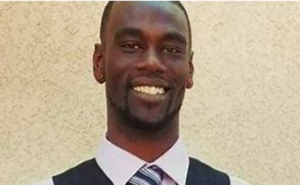
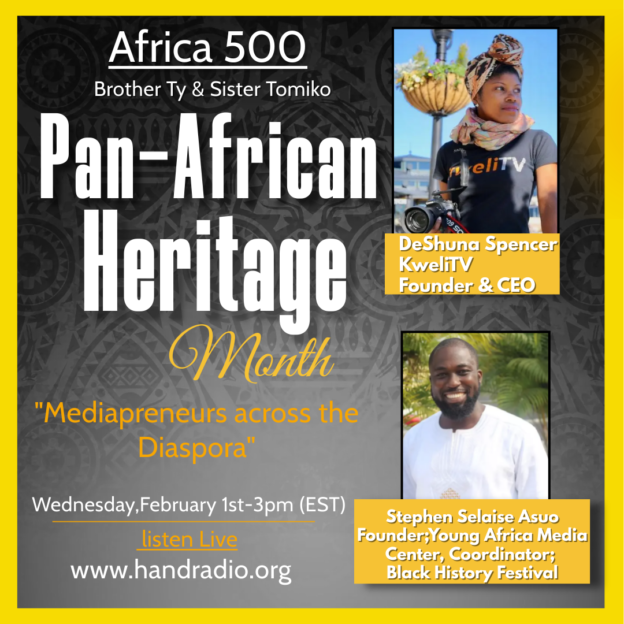
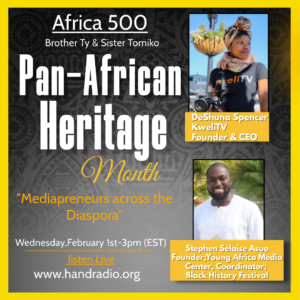 The February 1, 2023 edition of Africa 500 features guests DeShuna Spencer of KweliTV and Stephen Selaise Asuo of Young Africa Media Center and YALI TV.
The February 1, 2023 edition of Africa 500 features guests DeShuna Spencer of KweliTV and Stephen Selaise Asuo of Young Africa Media Center and YALI TV.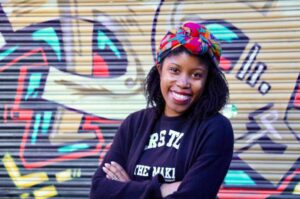
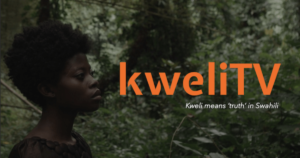 As a former journalist & radio host, DeShuna’s work focuses on the intersection of media images and implicit bias. She speaks frequently on media representation, diversity in the streaming & the OTT space, social entrepreneurship, the effects of Black trauma content, challenges & opportunities in the media landscape, starting a media tech venture, women in media & tech, and her journey as a Black founder.
As a former journalist & radio host, DeShuna’s work focuses on the intersection of media images and implicit bias. She speaks frequently on media representation, diversity in the streaming & the OTT space, social entrepreneurship, the effects of Black trauma content, challenges & opportunities in the media landscape, starting a media tech venture, women in media & tech, and her journey as a Black founder.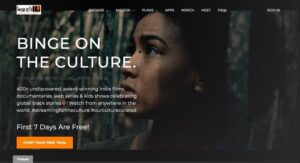 Being a niche streaming player is never easy, and the list of failed ventures is long. But as major streaming services become more expensive, bloated, and cumbersome to navigate, it may create an opportunity for smaller companies with a more specific point of view–KweliTV among them.
Being a niche streaming player is never easy, and the list of failed ventures is long. But as major streaming services become more expensive, bloated, and cumbersome to navigate, it may create an opportunity for smaller companies with a more specific point of view–KweliTV among them.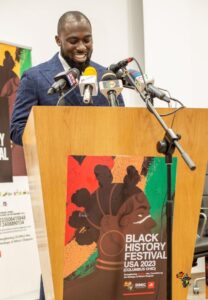
 Currently he is the founder/CEO of Young Africa Media Center and general manager of YALI TV, a fast-growing online television channel dedicated to tell the stories and impacts of YALI Alumni and young leaders across Africa. He leads over a 100 YALI TV Correspondents and associates across Africa, and the channel has covered major events on the continent in English, Portuguese and French. He is also the coordinator of the Black History Festivals which began in 2022. The 2023 Black History Festival will take place in Columbus Ohio.
Currently he is the founder/CEO of Young Africa Media Center and general manager of YALI TV, a fast-growing online television channel dedicated to tell the stories and impacts of YALI Alumni and young leaders across Africa. He leads over a 100 YALI TV Correspondents and associates across Africa, and the channel has covered major events on the continent in English, Portuguese and French. He is also the coordinator of the Black History Festivals which began in 2022. The 2023 Black History Festival will take place in Columbus Ohio. 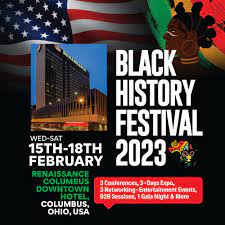 As he continues to develop content best in value-based leadership, Stephen aspires to be a renowned Media Entrepreneur and Development Communication Consultant in Ghana. Steven hopes to transform the socioeconomic fortunes of the continent through a renewed media vision for Africa through leadership, storytelling and peer partnerships.
As he continues to develop content best in value-based leadership, Stephen aspires to be a renowned Media Entrepreneur and Development Communication Consultant in Ghana. Steven hopes to transform the socioeconomic fortunes of the continent through a renewed media vision for Africa through leadership, storytelling and peer partnerships.